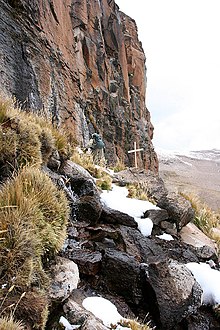 The Amazon river has a series of major river systems in Colombia, Ecuador and Peru, some of which flow into the Marañón and Ucayali, others directly into the Amazon proper. Among others, these include the following rivers: Putumayo, Caquetá, Vaupés, Guainía, Morona, Pastaza, Nucuray, Urituyacu, Chambira, Tigre, Nanay, Napo, and Huallaga.
The Amazon river has a series of major river systems in Colombia, Ecuador and Peru, some of which flow into the Marañón and Ucayali, others directly into the Amazon proper. Among others, these include the following rivers: Putumayo, Caquetá, Vaupés, Guainía, Morona, Pastaza, Nucuray, Urituyacu, Chambira, Tigre, Nanay, Napo, and Huallaga.The most distant source of the Amazon was established in 1996, 2001, 2007, and 2008, as a glacial stream on a snowcapped 5,597 m (18,363 ft) peak called Nevado Mismi in the Peruvian Andes, roughly 160 km (99 mi) west of Lake Titicaca and 700 km (430 mi) southeast of Lima. The waters from Nevado Mismi flow into the Quebradas Carhuasanta and Apacheta, which flow into the Río Apurímac which is a tributary of the Ucayali which later joins the Marañón to form the Amazon proper. While the Ucayali–Marañón confluence is the point at which most geographers place the beginning of the Amazon proper, in Brazil the river is known at this point as the Solimões das Águas. Shortly downriver from that confluence the darkly colored waters of the Rio Negro meet the sandy colored Rio Solimões, and for over 6 km (4 mi) these waters run side by side without mixing.
After the confluence of Río Apurímac and Ucayali, the river leaves Andean terrain and is instead surrounded by floodplain. From this point to the Marañón, some 1,600 km (990 mi), the forested banks are just out of water, and are inundated long before the river attains its maximum flood stage. The low river banks are interrupted by only a few hills, and the river enters the enormous Amazon Rainforest.
The river systems and flood plains in Brazil, Peru, Ecuador, Colombia and Venezuela, whose waters drain into the Solimões and its tributaries are called the "Upper Amazon". The Amazon River proper runs mostly through Brazil and Peru, it is part of the border between Colombia and Perú, and it has tributaries reaching into Venezuela, Colombia, Ecuador, and Bolivia.
0 comments:
Post a Comment